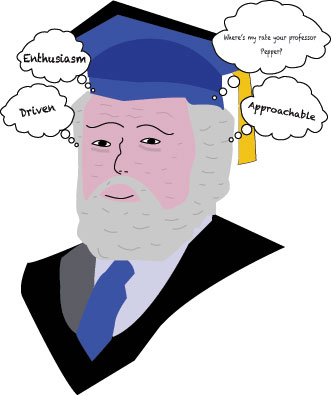Piper Award recognizes outstanding professors

Stephanie Brown
The Signal
There are many qualities that make a good professor – qualities that the UHCL Piper Award nominees share. The nominations are in for this year’s Piper Award.
Beginning in 1958, the Piper Award recognizes outstanding professors ranging from two- to four-year public or private colleges and universities in Texas. Last year, Stuart Larson, associate professor of graphic design, was UHCL’s Piper Award finalist.
“You don’t just have to be passionate, but you have to be excited,” Larson said. “You have to really love the subject you teach. If you as a faculty member are not excited about your subject, you are not going to win the students’ interest.”
The Piper Award solely judges professors based on the category of teaching, but the UHCL panel also judges their nominees on the dimensions of leadership, service on campus, service off campus, and honors/professional societies.
“We calculate the nominations in two ways,” said David Rachita, interim dean of students, who facilitates the enroll process as well as the decision-making process. “One is through pure number of nominations, and the other one is a ratio based on the number of credit hours taught and the number of nominations.”
Favorable qualities of professors tend to be universal across campus, as many students strive for an interesting, funny and knowledgeable teaching experience.
“An awesome professor possesses passion for their field of work to engage their students with novel ideas and guide intellectually stimulating classroom discussions,” said Timothy Duffield, applied cognitive psychology major. “The traits that I look for in a professor are enthusiasm, integrity and commitment to students.”
Students feel it is also important for faculty to remember that students have busy lives outside of school; some may have full time jobs, or some may have families to take care of at home.
“I prefer professors who allow creativity in the projects they assign but who also understand that life happens and you can’t always be in class,” said Stephanie Eddy, studio arts major.
Interaction/accessibility with students is also a quality that students look for in a professor, and it is important that the professor is easy to contact either through office hours, phone or e-mail.
“A professor should be interactive with students, as well as have knowledge and a grip on the subject,” said Anusha Obbilisetty, biotech major. “Whenever students approach, the professor should make it a point to help them. The professor should interact with every person and make sure every student is comfortable with the teaching style.”
Students’ success rate is yet another teaching trait the student body desires from professors; the professor should want his or her students to achieve not only in education but in life.
“In my opinion, a great professor is hard to find,” said Kristen Martin, history major. “He inspires curiosity, is approachable, knowledgeable and passionate, and ultimately seeks the success of the students. He has a contagious excitement about what he does. He is happy, friendly, wise and loud.”
One method students use to find good professors is through the website RateMyProfessor.com. This website allows students to share reviews about professors, as well as rate them on a 1-5 scale in the following categories: easiness, helpfulness, clarity, the rater’s interest in the class prior to taking it, and the degree of textbook used in the course.
“The website helps me find the professors I think will work best with my learning style,” said Chelsea McCoy, EC-6 generalist and EC-12 special education major. “If students want an interactive teacher, they can see the options, or if they want a lecture teacher, they can find one of those too.”
All in all, students seek a professor who genuinely cares not only about the course, but about students’ success. The Piper Award is designed to recognize these teachers, especially through nominations by the students themselves.
“This award really means a lot because it is student driven,” Larson said. “I highly encourage each student to nominate his or her favorite professor. Even if the faculty member is not a finalist or a nominee, just knowing that students have included their name really means a lot.”
The Piper Award is not only important for professors or students, but it is also a way to honor UHCL as a whole.
“I think The Piper Award is important for the university because it gives us a chance to show off,” Rachita said. “Look at the great faculty we have, and they are doing great things in the classroom.”
The UHCL finalist will be announced in the spring semester, and he or she will move on to a statewide competition. The statewide nominees/finalists will be publicized around May 1, 2013. For more information regarding the Piper Award, visit http://www.everychanceeverytexan.org/funding/programs/piperprofessors.php.

